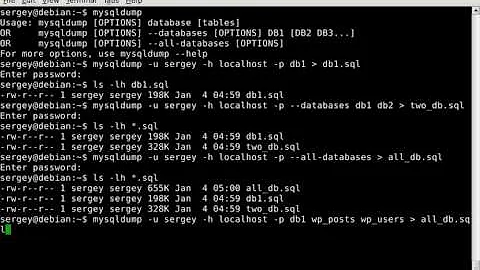How can I speed up a MySQL restore from a dump file?
Solution 1
One thing that may be slowing the process is the key_buffer_size, which is the size of the buffer used for index blocks. Tune this to at least 30% of your RAM or the re-indexing process will probably be too slow.
For reference, if you were using InnoDB and foreign keys, you could also disable foreign key checks and re-enable it at the end (using SET FOREIGN_KEY_CHECKS=0 and SET FOREIGN_KEY_CHECKS=1).
Solution 2
This link shows what one can do to speed up restoring process.
http://dev.mysql.com/doc/refman/5.5/en/optimizing-innodb-bulk-data-loading.html
One can put put the commands at the top of the dump file
SET @OLD_AUTOCOMMIT=@@AUTOCOMMIT, AUTOCOMMIT = 0;
SET @OLD_UNIQUE_CHECKS=@@UNIQUE_CHECKS, UNIQUE_CHECKS = 0;
SET @OLD_FOREIGN_KEY_CHECKS=@@FOREIGN_KEY_CHECKS, FOREIGN_KEY_CHECKS = 0;
And put these statements at the end of the dump file
SET FOREIGN_KEY_CHECKS=@OLD_FOREIGN_KEY_CHECKS;
SET UNIQUE_CHECKS=@OLD_UNIQUE_CHECKS;
SET AUTOCOMMIT = @OLD_AUTOCOMMIT;
COMMIT;
This worked for me. Happy restoring :-)
Solution 3
If you have the physical copy of the dump file (the DB directory), you can just copy it to the new server if the new server have the same MySQL version and it will work fine. This work fine with MyISAM and for me I think it is better than restoring the data based on the logical SQL dump file.
Solution 4
This will do:
mysql --init-command="SET SESSION FOREIGN_KEY_CHECKS=0;SET UNIQUE_CHECKS=0;" -u root -p < Backup_Database.mysql
Solution 5
The only reason I can image why the restore would gradually slow down is indexing. Investigate turning off indexing until the end and then let it do the whole lot at once.
Related videos on Youtube
Dave Forgac
Updated on September 17, 2022Comments
-
Dave Forgac almost 2 years
I am restoring a 30GB database from a mysqldump file to an empty database on a new server. When running the SQL from the dump file, the restore starts very quickly and then starts to get slower and slower. Individual inserts are now taking 15+ seconds. The tables are mostly MyISAM with one small InnoDB. The server has no other active connections.
SHOW PROCESSLIST;only shows the insert from the restore (and the show processlist itself).Does anyone have any ideas what could be causing the dramatic slowdown?
Are there any MySQL variables that I can change to speed the restore while it is progressing?
-
Dave Forgac about 14 yearsEdited to correct the table types
-
-
Marco Ramos about 14 yearswow! Glad it helped :)
-
Dave Forgac over 11 yearsI just noticed that I typed '5' minutes. I'm pretty sure it was more like 50 minutes but still way more reasonable ;-)
-
mc0e about 7 years@FernandoFabreti - that's an important point for many readers, but the OP did specify they had mostly MyISAM
-
sdeland almost 7 yearsThis helped quite a bit. Rather than edit the file, I created pre.sql and post.sql from the snippets above and used that to restore the db:
cat pre.sql dump.sql post.sql | mysql ... -
 svandragt almost 7 yearsThis is now deprecated and should only be used to restore test data, not for restoring actual backups.
svandragt almost 7 yearsThis is now deprecated and should only be used to restore test data, not for restoring actual backups. -
user2335065 almost 4 years@JasonR.Coombs What if my dump.sql is a gzip file?
-
sshow almost 4 years@user2335065 then you can do for example
cat pre.sql <(gzip -cd dump.sql.gz) post.sql | mysql ...




